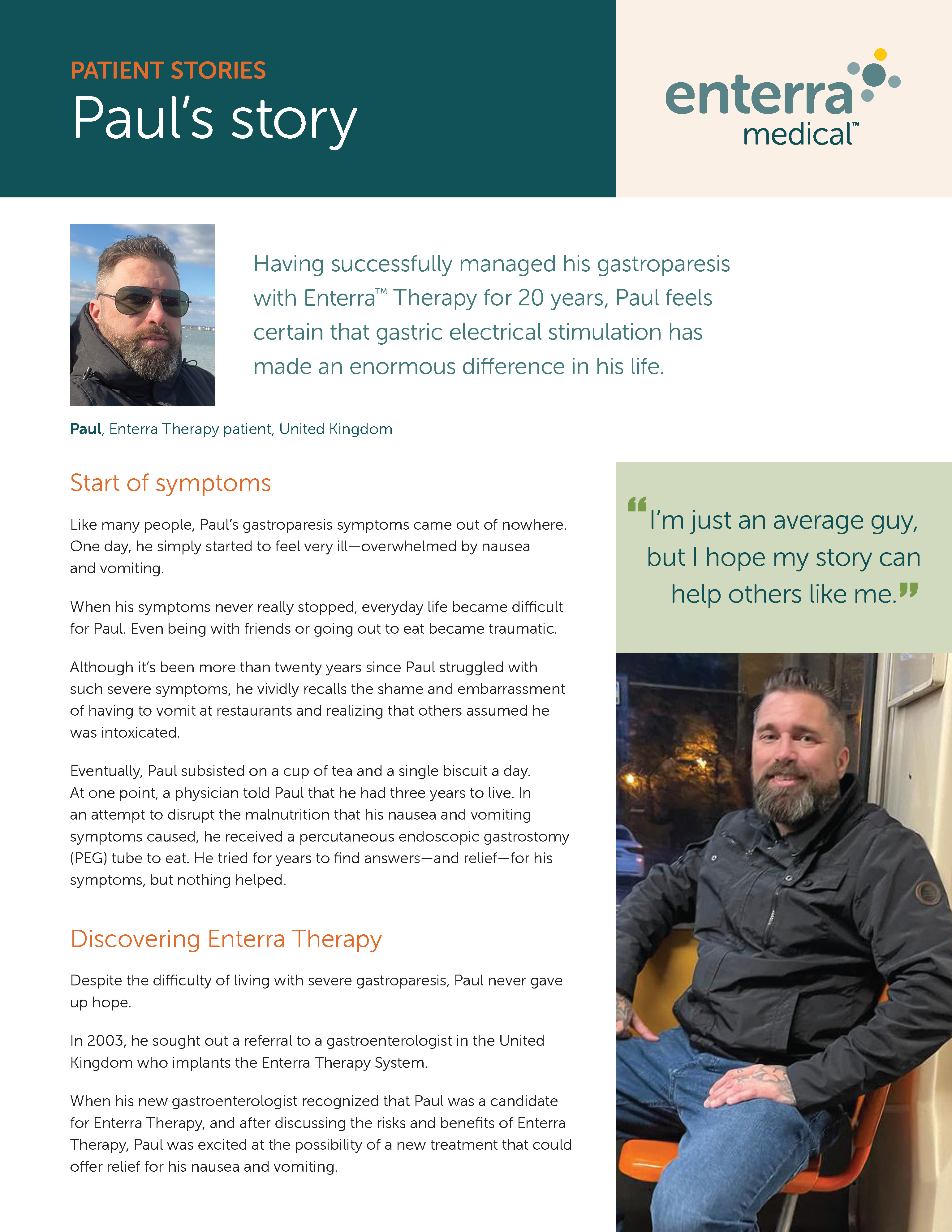Paul’s story
When Paul’s symptoms were at their most severe, he lived on a cup of tea and a single biscuit a day. Now, 20 years after receiving Enterra Therapy, Paul is a passionate advocate for others with gastroparesis.

Paul, Enterra® Therapy patient, United Kingdom
Start of symptoms
Like many people, Paul’s gastroparesis symptoms came out of nowhere. One day, he simply started to feel very ill—overwhelmed by nausea and vomiting.
When his symptoms never really stopped, everyday life became difficult for Paul. Even being with friends or going out to eat became traumatic.
Although it’s been more than twenty years since Paul struggled with such severe symptoms, he vividly recalls the shame and embarrassment of having to vomit at restaurants and realizing that others assumed he was intoxicated.
Eventually, Paul subsisted on a cup of tea and a single biscuit a day. At one point, a physician told Paul that he had three years to live. In an attempt to disrupt the malnutrition that his nausea and vomiting symptoms caused, he received a percutaneous endoscopic gastrostomy (PEG) tube to eat. He tried for years to find answers—and relief—for his symptoms, but nothing helped.
Discovering Enterra® Therapy
Despite the difficulty of living with severe gastroparesis, Paul never gave up hope.
In 2003, he sought out a referral to a gastroenterologist in the United Kingdom who implants the Enterra Therapy System.
When his new gastroenterologist recognized that Paul was a candidate for Enterra Therapy, and after discussing the risks and benefits of Enterra Therapy, Paul was excited at the possibility of a new treatment that could offer relief for his nausea and vomiting.
Life with Enterra Therapy
Now, twenty years after receiving his Enterra Therapy System, Paul says his life has certainly changed for the better.He works full-time in hospital security, and finds joy in spending time with his two teenage daughters.
Although he still lives with gastroparesis, his symptoms are well under control. He visits his gastroenterologist about every eight weeks to ensure that he’s getting the right level of stimulation.
Because of his experience, he understands how little some doctors know about the disease—and how it can take away from patients’ everyday lives. Paul is a passionate advocate for other people who live with gastroparesis.
Today, Paul looks back and feels thankful for the positive difference that Enterra Therapy has made in his life, and hopes that his story can help give others strength.

Paul’s experience is unique to him and individual results may vary.
IMPORTANT SAFETY INFORMATION
Enterra Therapy for treatment of chronic, resistant to medication nausea and vomiting associated with gastroparesis caused by diabetes or an unknown origin in patients aged 18 to 70 years: patients should always discuss potential risks and benefits of the device with their physician.
HUMANITARIAN DEVICE
Authorized by Federal law for use in the treatment of chronic intractable (drug refractory) nausea and vomiting secondary to gastroparesis of diabetic or idiopathic etiology in patients aged 18 to 70 years. The effectiveness of this device for this use has not been demonstrated. What does this mean?

